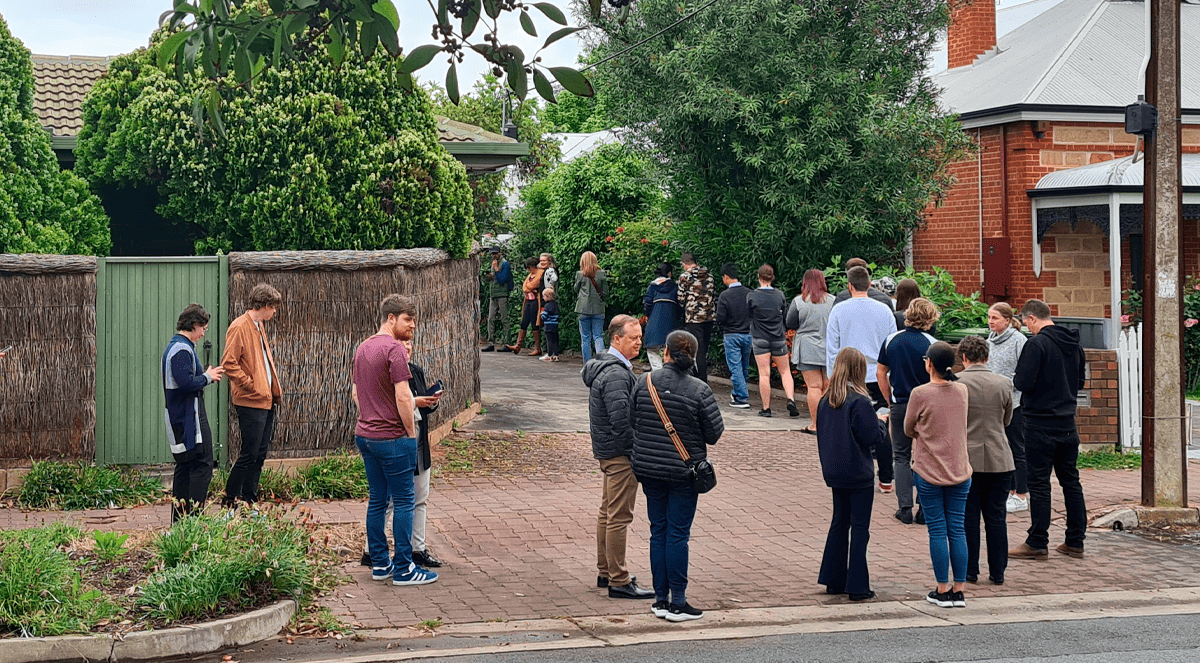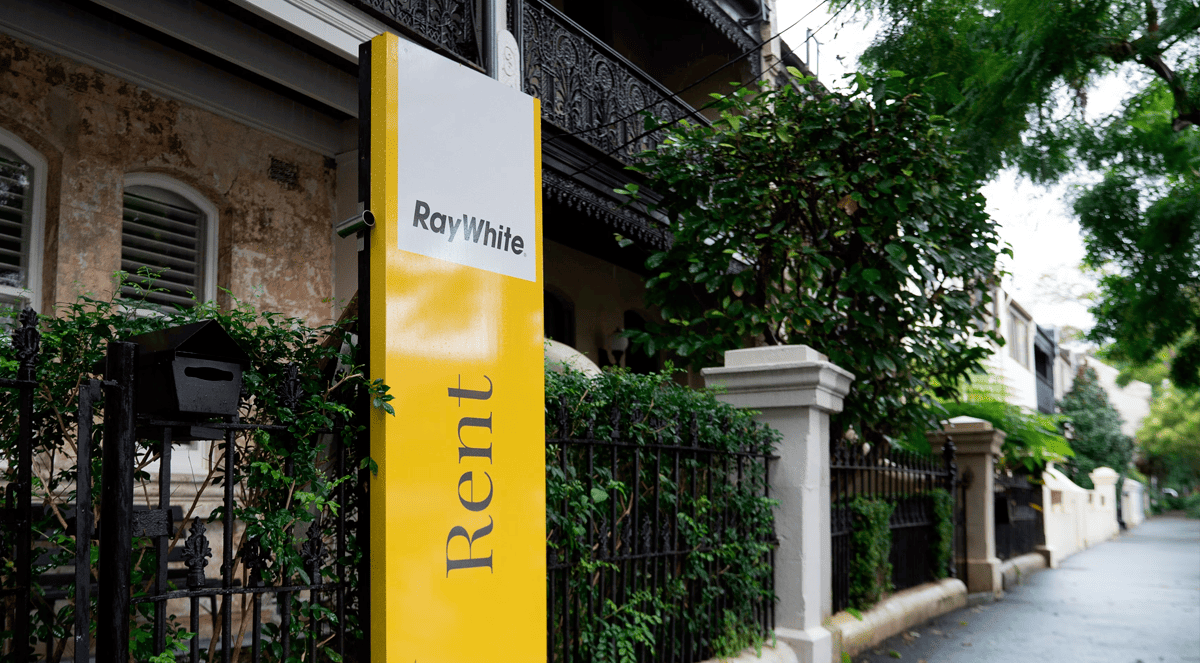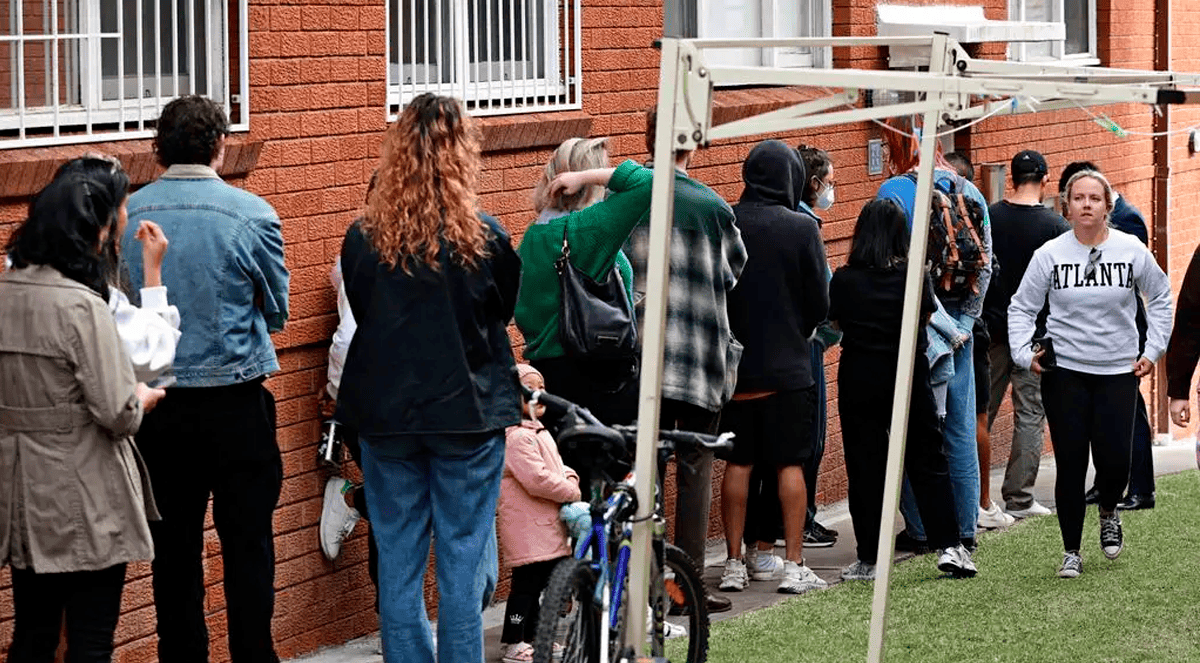Features > Property News & Insights > Market updates
FOMO fuels first-home buyer surge – but at a cost
.png)
Image by Janie Barrett/SMH
KEY POINTS
- Financial comparison website Finder says FOMO (fear of missing out) is now the top driver for first-home buyers in Australia
- Two-thirds of first-home buyers expect to spend over 30% of their income on mortgage repayments, while nearly half have overspent or depleted their savings
- More first-home buyers are leaning on parental help, low-deposit loans, and rate cuts, as family and government support becomes key to breaking into the market
A new report on first-home buyers in Australia says the majority of buyers no longer just have an aspiration to own a home - they’re also being driven by the fear of missing out (FOMO) before housing gets more unaffordable.
As a result of that FOMO, Finder’s latest First Home Buyer Report says nearly 2 in 3 buyers expect to spend 30% or more of their household income on mortgage repayments, technically putting them into “mortgage stress”.
The report also finds almost half of first-home buyers who purchased a property in the past year now say they regret their decision.
FOMO
When Finder last surveyed first-home buyers in 2022, the financial comparison website says many respondents cited the “fear of missing out” as a key driver.
“A mix of peer pressure and concern that property prices would rise faster than wages prompted some to buy before they were priced out,” Finder’s First Home Buyer 2025 Report says.
“Since then, property price anxiety has only grown, rising from 31% in 2022 to 38% today.”
Another driver of FOMO is the fact that two in three buyers say they’ve missed out on a property they were seriously considering.
Being outbid by a competing buyer was the most common reason, affecting one in three buyers.
Searching for a first home is also taking longer, with Finder saying the number of buyers spending a year or more searching has risen by 24% since 2022.
As the report’s authors point out, there are “real benefits to escaping the rental market and owning your own home”, including being able to renovate and make adjustments to the property.
But there are also psychological advantages.
“Finder research shows that these do translate into tangible outcomes: mortgage holders report higher happiness levels than renters and owning a home outright increases this further,” the report says.
While happiness may be linked to homeownership, the problem is that first-home buyers are taking on higher and higher levels of debt to get into the market.
“FOMO, fuelled by rising prices and social pressure, has overtaken traditional financial planning for many buyers,” says Finder’s Head of Consumer Research, Graham Cooke.
“More than half of all first-home buyers are taking on high levels of mortgage stress, and a concerning number are purchasing over budget and depleting their entire savings to get on the ladder.
“This kind of financial risk-taking reflects not just ambition, but anxiety – the belief that if you don’t buy now, you may never be able to.”
Regrets
Finder’s research found 65% of first-home buyers spend, or expect to spend, 30% or more of their pre-tax household income on loan repayments, technically putting them into “mortgage stress”.
Almost half (47%) of first-time buyers also said they’d paid more for a home than they budgeted, a significant increase from 38% in 2022.
As a result, 1 in 7 Australians who bought their first home in the past 12 months have no savings left, while 1 in 3 have less than $10,000 remaining.
For 45% of buyers who purchased their first home in the past year, this has led them to regret their decision.
“The two most common regrets are paying too much for the home and not saving a large enough deposit, which together account for 76% of all regrets,” the report says.
Bank of Mum & Dad
Finder’s First Home Buyer Report 2025 reveals that 17% of first-home buyers admitted receiving money from parents to help with purchasing a property, up from just 11% in 2022.
Among buyers without support, 40% took 5 years or more to save a deposit, compared to just 29% of those who received family assistance.
Finder says the average first-home buyer who received parental help also had 41% more leftover in their savings after buying their first home.
Banking
According to Finder, 60% of first-home buyers say recent interest rate cuts are influencing their decision to buy now.
They were also pragmatic about shopping around for the best home loan deal, with one-third of new buyers not taking out their home loan with their usual bank.
Saving for a standard deposit also seems less common, with seven in ten first-home buyers saying they’d purchased a property by putting down less than 20%.
Nearly 80% say they’d already applied for, or plan to apply for, government first-home buyer support schemes, including low deposit guarantee programs.
Interestingly, the fear of missing out on home ownership is so strong that a quarter of first-home buyers told Finder they were searching for a home in a different region or state to where they currently live.
“Owning a home should not require a decade of saving, the help of your parents or the acceptance of mortgage stress as a norm,” says Finder’s Head of Consumer Research, Graham Cooke.
“The fact that so many Australians are willing to take on that challenge anyway is a testament to the enduring cultural power of homeownership – and the hope that things might get easier.”
Mr Cooke says that with the Reserve Bank of Australia slashing rates in February and May of this year and market forecasts of more cuts, those hopes could be justified.
“For first-home buyers, this could mean real relief – lower repayments, greater borrowing capacity and a slightly less hostile path to ownership.
“It won’t fix structural affordability overnight, but it may provide the breathing room needed for more Australians to enter the market on safer, more secure terms,” he says.
“First-home buyers have shown remarkable resilience – now, with a bit of policy support and continued rate relief, their dreams of homeownership may not just be possible, but sustainable.”
Stay Up to Date
with the Latest Australian Property News, Insights & Education.




.png?width=292&height=292&name=Copy%20Link%20(1).png)
 SIGN UP FOR FREE NEWSLETTER
SIGN UP FOR FREE NEWSLETTER





%20Scott%20Kuru%20DPU%20141.jpg?width=1920&height=1080&name=The%20Senate%20Just%20Exposed%20Australias%20Biggest%20$80%20Billion%20Housing%20Fraud%20(Inquiry%20Launched)%20Scott%20Kuru%20DPU%20141.jpg)





%20Scott%20Kuru%20DPU136.jpg?width=1920&height=1080&name=Aussies%20Just%20Got%20Hit%20With%20Double%20Taxes%20on%20Everything%20(This%20Has%20Gone%20Too%20Far)%20Scott%20Kuru%20DPU136.jpg)


%20Scott%20Kuru%20DPU%20133.jpg?width=1920&height=1080&name=JUST%20IN%20Something%20Major%20Just%20Flipped%20Australia%E2%80%99s%20Property%20Market%20for%202026%20(No%20One%20Saw%20This%20Coming)%20Scott%20Kuru%20DPU%20133.jpg)


.jpg?width=1920&height=1080&name=Rental%20Prices%20At%20Record%20Highs%20And%20Vacancy%20Rates%20At%20All%20Time%20Lows%20(New%20Data%20Reveals).jpg)
%20%20DPU%20EP%2014.jpg?width=1920&height=1080&name=Investors%20Shutting%20Out%20First%20Home%20Buyers%20(Investors%20At%20Record%20Highs)%20%20DPU%20EP%2014.jpg)

.jpg?width=1920&height=1080&name=Darwins%20Property%20Market%20Boom%20or%20Dangerous%20Gamble%20(REVEALED).jpg)

.jpg?width=1920&height=1080&name=The%20RBA%E2%80%99s%20Rate%20Cut%20Could%20Explode%20House%20Prices%20(Here%E2%80%99s%20Why).jpg)








.jpg?width=1920&height=1080&name=Warning%2c%20You%20Might%20Be%20Facing%20Higher%20Taxes%20Soon%20(1).jpg)




.png?width=1920&height=1080&name=Rate%20Drops%20Signal%20BIGGEST%20Property%20Boom%20in%20DECADES%20(1).png)

.jpg?width=1920&height=1080&name=Labor%20vs%20Liberal%20These%20Housing%20Policies%20Could%20Change%20the%20Property%20Market%20Forever%20(1).jpg)
.jpg?width=1920&height=1080&name=QLD%20Slashes%20Stamp%20Duty%20Big%20News%20for%20Investors%20%26%20Home%20Buyers%20(1).jpg)
.jpg?width=1920&height=1080&name=Trump%20Just%20Slapped%20Tariffs%20%E2%80%93%20Here%E2%80%99s%20What%20It%20Means%20for%20Australia%20(1).jpg)
.jpg?width=1920&height=1080&name=Federal%20Budget%202025%20More%20Debt%2c%20No%20Housing%20%E2%80%93%20Here%E2%80%99s%20What%20You%20Need%20to%20Know%20(1).jpg)
.jpg?width=1920&height=1080&name=Australias%20Housing%20Crisis%20is%20about%20to%20get%20MUCH%20Worse%20(New%20Data%20Warns).jpg)
%20(1).jpg?width=1920&height=1080&name=Australias%20RENTAL%20CRISIS%20Hits%20ROCK%20BOTTOM!%20(2025%20Update)%20(1).jpg)
%20(1).png?width=1920&height=1080&name=Is%20Adelaide%20Still%20a%20Good%20Property%20Investment%20(2025%20UPDATE)%20(1).png)
.jpg?width=1920&height=1080&name=RBA%20Shocks%20with%20Rate%20Cuts!%20What%E2%80%99s%20Next%20for%20Property%20Investors%20(1).jpg)
%20(1).jpg?width=1920&height=1080&name=I%20Predict%20The%20Feb%20Rate%20Cut%20(My%20Price%20Growth%20Prediction)%20(1).jpg)
.png?width=1920&height=1080&name=Why%20Property%20Prices%20Will%20Rise%20in%202025%20Market%20Predictions%20(1).png)
.jpg?width=1920&height=1080&name=Why%20Investors%20Are%20Choosing%20Apartments%20Over%20Houses%202%20(1).jpg)
.jpg?width=1920&height=1080&name=Why%20Rate%20Cuts%20Will%20Trigger%20A%20Property%20Boom%20(1).jpg)
.jpg?width=1920&height=1080&name=Retire%20On%202Million%20With%20One%20Property%20(Using%20SMSF).jpg)
.jpg?width=1920&height=1080&name=4%20Reasons%20Why%20You%20Should%20Invest%20in%20Melbourne%20Now%20(1).jpg)
%20(1).jpg?width=1920&height=1080&name=Old%20Property%20vs%20New%20Property%20(Facts%20and%20Figures%20Revealed)%20(1).jpg)
%20(1).jpg?width=1920&height=1080&name=Will%20The%20New%20QLD%20Govt%20Create%20a%20Property%20Boom%20or%20Bust%20(My%20Prediction)%20(1).jpg)
%20Scott%20Kuru%20(1).jpg?width=1920&height=1080&name=Inflation%20Hits%20Three-Year%20Low%20(Will%20RBA%20Cut%20Rates%20Soon)%20Scott%20Kuru%20(1).jpg)
.jpg?width=1920&height=1080&name=How%20to%20Buy%20Investment%20Property%20Through%20SMSF_%20The%20Ultimate%20Guide%20(1).jpg)
.jpg?width=1920&height=1080&name=Victoria%20Slashes%20Stamp%20Duty%20Melbourne%20Set%20to%20Boom%20Scott%20Kuru%20(1).jpg)
.png?width=1571&height=861&name=Are%20Foreign%20Buyers%20Really%20Driving%20Up%20Australian%20Property%20Prices%20(1).png)
.jpg?width=1920&height=1080&name=The%20Single%20Factor%20That%20Predicts%20Property%20Growth%20Regions%20(1).jpg)
%20Scott%20Kuru%20(1).jpg?width=1920&height=1080&name=My%20Prediction%20On%20Rates%20%26%20Negative%20Gearing%20(Market%20Crash)%20Scott%20Kuru%20(1).jpg)

-1.png?width=1920&height=1080&name=Major%20Banks%20Cut%20Rates%20Will%20RBA%20Follow%20Suit%20(Sept%20Rate%20Update)-1.png)
%20Scott%20Kuru-1.png?width=1920&height=1080&name=Rate%20Cut%20Coming%20What%20New%20Zealands%20Move%20Means%20for%20Australia%20(Sept%20Prediction)%20Scott%20Kuru-1.png)
%20(1).jpg?width=1920&height=1080&name=Buy%20when%20the%20interest%20rates%20are%20high!%20(Why%20you%20must%20buy%20now!)%20(1).jpg)
.jpg?width=1920&height=1080&name=Carms_Revised%20Taxes%20Due%20Aug%209%20YT%20Thumbnail02%20(1).jpg)
.jpg?width=1920&height=1080&name=Carms_Too%20Little%20Too%20Late%20Aug%207%20YT%20Thumbnail01%20(1).jpg)









.jpg?width=1920&height=1080&name=Carms_Rate%20Drop%20In%20July%20Jun%2010%20YT%20Thumbnail02%20(1).jpg)
.jpg?width=1920&height=1080&name=Carms_Own%20a%20Property%20V6%20Jun%205_YT%20Thumbnail%20(1).jpg)









.png?width=1920&height=1080&name=Artboard%201%20(3).png)






.jpg?width=1920&height=1080&name=YT%20thumbnail%20%20(1).jpg)

